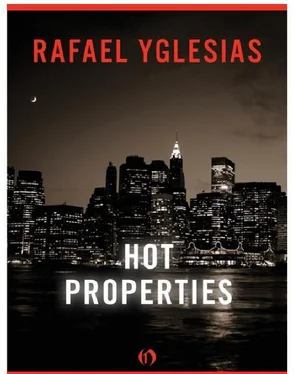Her mouth quivered as she entered, closing the door behind her so no one could hear his ranting.
“What do I have to do!” he yelled, standing up at his desk. Behind him was a view of Fifth Avenue swarming with tiny cars and insect people. “Do you know what that asshole”—he pointed with contempt at his phone—“screamed at me? I had to listen to a nut call me a liar and a thief because you don’t pay attention! When I tell you not to put someone through, listen to the name! Remember it!” he shrieked at her. Though his voice was basso, the attitude— his arms waving in the air, his eyes scanning wildly — was hysterical and shrill.
Tears spilled from her eyes. She put up no struggle against either his accusations or her shame. She thought and felt nothing but shame, appalling shame at her uselessness.
“I’ve warned you over and over. How often can I make the excuse to myself and to the other editors here whom you repeatedly screw up with your incompetence, how many times can I say,” and now he transformed himself into a mincing pose, holding his hands up in front of him, like a puppy begging for food, “ ‘Oh, poor little Patsie. she’s so silly and helpless, but we don’t mind ’cause she can bat her eyes so pretty.’ ”
Later, of course, she could answer this abuse. Later, she wouldn’t agree with his evaluation of her work. But while he yelled, there was no Patty inside her to step forward and argue back. She thought it the most peculiar thing about her, the sickest thing about her, the one trait she wished she could be free of forever: she accepted any role that people cast her in. The more Jerry Gelb claimed she was a ditsie blond, the more she became one. Only when alone could she be herself. But she loathed being alone.
However, these periodic fits by Gelb were always followed by weeks of pampering. He would take her out with clients, praise her to agents, buy her a trinket, behave, in a word, like a repentant lover.
Eventually the tantrums became less frequent. Gelb selected a new assistant to yell at. Patty was grateful for this neglect and thought it was a victory. At last Gelb had recognized her worth.
And then, one day, he summoned her to the office without there having been a fuck-up.
“How are you?” he asked. This time, he was the one who closed his door for privacy. It was five o’clock. The insects below were heading home.
“I don’t know,” she said, staring at him with a look of shock. This formal question about her health was unusual, and so she took it seriously.
“You don’t?” he looked distressed by her answer. “I thought things were going well. You have a boyfriend.”
“I do?”
“I thought so. The actor.”
“Oh, him. I haven’t seen him in months. He was never a boyfriend. I’ve been dating someone else.”
Gelb smiled encouragingly.
“I just broke up with him,” Patty added.
Gelb again looked as if this news were a great blow to him. “I’m sorry.”
Patty smiled at him languidly. “It’s all right,” she said, and then laughed. “Sweet of you to worry.”
“Are you busy tonight?”
“A friend at Rockers has tickets to a screening of Raging Bull.”
“Oh, good.” At last an answer he wanted. He smiled nervously, cleared his throat, and said, “I don’t know how to tell you this, but I think a direct approach—”
Even at this moment, Patty had no suspicion that she was about to be fired. Gelb’s reputation was one of ferocity. He fired people on the spot. No leisurely hand-wringing chats in the office. Besides, he never let her feel that she was vulnerable to being fired. She was the ditsie blond, not a young turk who had to either produce or die.
“—but I’m going to have to let you go. We’ve had a ghastly year. One of the worst in publishing history. We overprinted on Gold Search and underprinted on Jumpers, we’ve suffered lower sales in every department because of the recession. Everything’s gone wrong that possibly could. We have to cut down on staff and you’re the choice.” He said all this very quietly, embarrassed. He said it all as if she knew it.
“I don’t understand.”
Gelb sighed and looked away. “You know that someone has to suffer when things go bad. It isn’t personal. Double-day let a third of its staff go yesterday. You aren’t the only one here who will lose a job.”
She went numb to sensation, as if being in his office were a dream. Colors blurred, his voice came from a distance. FAILURE — punched onto the page of her brain. The word dominated — FAILURE. She felt as if she had been sentenced to die. All her life, she had dreaded this sort of occurrence. Getting a failing grade in school, being caught with drugs, not being accepted into a good college, meeting boys you like who reject you, and getting fired from a job. At last, FAILURE had struck. She had managed to avoid all the other calamities, she had even begun to lower her defenses … FAILURE. Gelb considered her so pathetic that not only was he firing her, he was doing it nicely!
“Please don’t do that!” Gelb stood up. “There’s no reason to cry.”
She hadn’t realized she was weeping. She put a hand on her cheek and her fingers slid on the wet surface.
“You can stay here for a month while you look for another job. I’ll give you great references. There’s unemployment insurance. It’s a paid vacation.”
“You just said there are no jobs,” she whined.
“I did?”
“If things are so bad, then no one’s going to hire me.”
“Oh, there’ll be jobs in a little while. Besides, you’re what? Twenty-five?”
“Twenty-six.”
“You don’t have to stay in publishing. I think you might be happier in … advertising. Or maybe working in publicity at a publishing house.”
“You don’t think I’m any good at editing.” Through her tears, she had the bitter voice of a heartbroken child, a girl on Christmas morning discovering she has gotten no toys. She hated herself for this weakness. It wasn’t her real self.
“Of course you are,” Gelb insisted. He wrinkled his thick brows together. This made the dark circles under his eyes more pronounced. “You need a jolt. A fresh start.”
She whined and complained for more than an hour. Gelb canceled a drink date and took her downstairs to an Indian restaurant where she ate so many hors d’oeuvres that she didn’t need any dinner. Gelb offered to buy that for her as well.
Now, as she stared into David Bergman’s mirror, what her mind retained was the shameful memory of her childish reaction to Gelb dismissing her. And her gullible acceptance of his story that firing her was part of a general cutback. Within a month after she left, the new assistant was given her old job, and last week Patty had learned from Marion that Gelb seemed to be having an affair with Patty’s successor. Only then did Patty realize how completely naive she was: Gelb had often asked her out on evening dates that she casually refused. Gelb took her rejections so calmly that Patty convinced herself he didn’t mind. She hadn’t put out, so he fired her. This conclusion amazed her. She had grown up reading in novels and seeing in movies exactly that scene played out, but it seemed a part of the fictional world, not the life she saw and experienced. Her father never had any affairs, she believed. And Gelb merely seemed like another version of her father: a big, disgruntled man who was frightened by tears and emotion in others. To think of him as a sexual being was both impossible and slightly revolting.
I’ve been a fool, she told herself, bringing her relentless replay of the scenes in Gelb’s office to a close. She got herself out of the bathroom and found the pot of coffee David Bergman had made for her. He’s sweet, she decided. And he wants sex, she reminded herself. Like every man, young and old — he wants it.
Читать дальше












